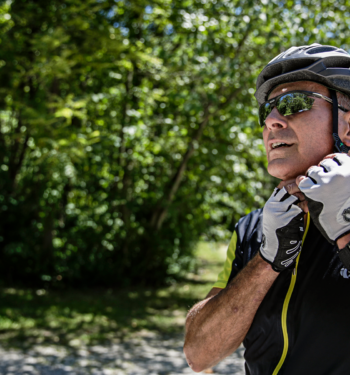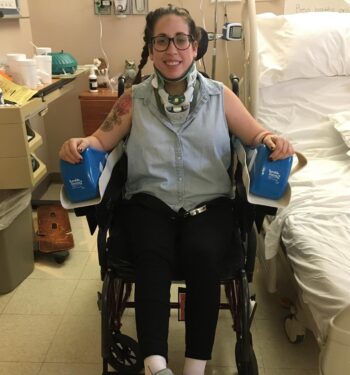January 11, 2018
Eric Jordan was living his dream. At the age of 41, Eric was singing bass with the New York Metropolitan Opera. He was living in New York City with his wife and 20-month-old son and reaching his peak as a vocalist.
But it was another voice—his son’s—that made the biggest difference in Eric’s life. One morning in September of 2012, he was awakened by his son’s crying and attempted to see what was the matter. Instead of walking to his son, Eric passed out and fell to the floor, paralyzed and unable to speak.
Eric suffered a massive stroke, and his life was in danger. But even if he recovered, Eric stood to lose his ability to sing: his career and his passion.
A child’s cry, a quick-thinking spouse, and an innovative procedure saved Eric’s life. But there was no guarantee they’d save his voice.
When stroke occurs, time is brain
Eric’s wife Christina noticed his drooping face and dangling arm. She called 911, and Eric was rushed to New York-Presbyterian/Columbia University Medical Center, where doctors found a blood clot blocking his proximal left middle cerebral artery: a major artery that supplies blood to the brain.
Eric didn’t respond to clot-busting drugs that are the first treatment for many victims of stroke. The next step was an endovascularthrombectomy, or emergent clot removal procedure, performed by Dr. Daniel Sahlein, an interventional neuroradiologist with Goodman Campbell Brain and Spine.
Dr. Sahlein used a revascularization device to perform the procedure. The device is inserted through a catheter or long tube which extends from the large artery in the patient’s leg through the arteries in the body and into the patient’s brain. The device self-expands so that when it exits the catheter, it opens to fill the artery, and can then be used like a rake to pull out the clot.
The operation was a success. Dr. Sahlein pulled out the clot and restored normal blood flow to Eric’s brain. The immediate danger was over. Now the question was, what would Eric’s condition be?
A recovery to sing about
After surgery, Eric couldn’t move his right side. He couldn’t speak or understand language.
But the next day, his ability to understand started to return. He still couldn’t speak, but Eric, his family, and his healthcare team were hopeful that his recovery would continue.
According to Dr. Sahlein, Eric was left with expressive aphasia. “He made a remarkable recovery in movement on the right side of his body and understanding language, but he initially had a severe expressive aphasia, or difficulty making speech.”
Which makes it all the more remarkable that, six weeks after his stroke, Eric was back on stage singing with the Metropolitan Opera.
“The stroke occurred in the left side of Eric’s brain, which is the side that controls language as well as motor skills for the right side of the body.” Interestingly, the brain center for making song is different than that for making speech. Eric was able to use his background as a musician to learn to communicate again.”
Even as he struggled to speak, Eric could sing. He worked on his singing with his coach from the Met and with Christina—an opera singer in her own right—and their son to get ready to return to work, and got the chance when a performer had jury duty and needed a replacement.
Today, Eric still sings opera at venues around the world. But he also recently gave Grand Rounds to the Departments of Neurological Surgery, Neurology, and Rehabilitation Medicine at IU Health and separately performed for another one of Dr. Sahlein’s patients.
The opera comes to Indy
Since his stroke, Eric’s path has led him to study music therapy. He received his BA in Music Therapy from Queen’s College in Charlotte, North Carolina, in 2017. He’s also been a spokesperson for Medtronic and has spoken before many physician groups and conferences.
Eric visited Indianapolis to take part in Goodman Campbell’s grand rounds continuing medical education event. After the educational program—at which Eric spoke eloquently and sang spectacularly for the assembled physicians—Dr. Sahlein and Eric met a stroke patient at the piano in the lobby of Goodman Hall.
“He’s really inspiring,” said Dr. Sahlein. “Not only that, the reviews of our grand rounds were overwhelmingly positive.”
Advancing science—and advancing the arts. It’s all in a day’s work at Goodman Campbell.


